Developments around relationships and dating have a relatively small speed premium, so I figured I would wait until I had a full post worth of them.
Indeed I now present such a post, in which I present several theories as to why so many of you might still be single.
While I am my usual opinionated self, I am not going to be offering a section of my list of related Good Advice. That would be its own project, which may or may not happen at some time in the future. There is still much in the way of practical implications or implied advice throughout.
Audio version can be found here.
You’re Single Because You’re Not Even Trying
A 2022 sample of singles is out, and charts are available, so that seems like a good place to start. None of this is properly representative or anything. It’s still good data.
It is reasonable for a quarter of singles to not want a relationship for whatever reason. What is not so reasonable is for the vast majority of those who do want one to not be making any attempt at finding one.
It is not always the case that if you want a relationship and you don’t have one, you should be actively looking for one. It is definitely not he case two-thirds of the time that you want a relationship that it is not worth actively looking.
The situation is getting worse.
This is usually not a question you want to leave to fate. If you want, go seek and you might find. If you do not want, or do not seek, you probably don’t get.
This is what not dating looks like.
Assuming as Alexander does that the No Response are the 0s above, this says that almost no currently single people, less than 20%, go on multiple first dates in a year.
I am not saying that dating is easy or that I found it to be easy. I will go ahead and say it is not once-a-year level hard for most people to find worthwhile first dates.
What I especially find curious is that one is the most popular response rather than zero. It would make sense to me that the answer is frequently zero dates, because you are not trying and aren’t ‘date ready’ in various senses. What’s super weird is that the vast majority did go on the one first date, but mostly they didn’t go on a second, and only half of those went on a third. It is as if people are capable of getting a date, then they go on one and recoil in ‘oh no not that again’ horror for about a year, then repeat the cycle? Or their friends set them up every year or so because it’s been too long, or something? None of that makes sense to me.
Alternatively, what the data is also saying is that getting a first date is indeed the primary barrier to finding a relationship. If you went on four or more first dates in the past year, which is one every three months or ~1% of nights, then it is highly unlikely you are single.
There is the stereotype of the person (usually but not always a woman) who goes on dates constantly, finding an endless string of losers. The data here suggests that this essentially is not a thing, or that if you do that it works.
Dating app use is surprisingly small even now.
The above seems very much like a world of people who are not trying. The 17% rate of using dating apps roughly corresponds to the percentage of people trying at all.
Polyamory is not a popular ideal sexual relationship (note this adds to 71%).
There is more analysis but the big lesson seems very clear - people who are single have mostly opted out or at least are very much not trying.
Causation could however go either way. If no one single is trying, that could be because everyone who tries will succeed. Or it could be because a lot of people are doomed to failure if they try, and they have learned this so they stopped trying.
Alexander also has another thread with great data, and this jumped out there.
That is rather insane. Note that men report being single more often than previously in the other age groups rather than less often, so this isn’t young women pairing off with older men unless those men are also all double timing. The math only offers a few possible explanations on what could have changed, all of them pretty wild.
You’re Single Because You Are The Fourth Child and Do Not Know How to Ask
Our culture makes it at least seem dangerous to pursue romantic relationships in many of the places where they would otherwise naturally develop. Bryan Caplan makes the case against restrictive sexual harassment laws, pointing out important things but some of the reasoning here seems very sloppy.
This graph tells a clear story.
Note that the numbers add up to slightly more than 100%, presumably due to overlap.
The online share going from 2% to 39% makes sense, as the internet took over our lives. What strikes me is that the bar and restaurant number also went up quite a lot, from 19% to 27%.
Whereas meeting through friends declined from 33% to 20%, a slightly lower share of the non-online meetings than in 1995, and through family went down even more. The work share of offline meetings is only down about 5%. School and college is down somewhat more.
This suggests that workplace sexual harassment rules and culture are not ‘getting ahead’ of the rest of our cultural norms, or getting that much in the way.
The problem of ‘you can’t show unwanted attention, but you can’t read minds’ is real, but it mostly lies elsewhere, including colleges, which often have rather harsh social penalties and even entire alternative justice systems scaring men off, as well as increasingly unbalanced gender ratios.
Why are bar and restaurant meetings rising even in absolute terms? I would guess that this is because they are contexts without repeated interactions, and thus where one faces much lower social penalties for attention that turns out to be unwanted, even more so than a lack of fear of formal retaliation. It is (mostly) safe to reach out.
Where I think Caplan has it wrong is to think that amount of attention is the primary impact of attractiveness. Attractiveness has many other, bigger advantages, across all of life. Quality of attention increases, response to your attention improves dramatically, as does your ability to get things you want, and your negotiating leverage both in dating and relationships and in general. Lookism is a big deal. On the traditional 0-10 scale, people want to be 10s when you ask them, but as I understand it 10s actually get less attention than 8s because people are scared to approach someone too far out of their league. And of the attention the 10s do get, you are selecting heavily for people willing to approach and able to keep their heads on straight around a 10, which likely does not correlate with the people you actually want.
Perhaps you could use Twitter?
Prince Vogelfrei: Deleted all dating apps. Decided to try to meet someone the old-fashioned way: God making a woman out of my rib.
Elon Musk: Try meeting someone on this platform. Many have.
Prince Vogelfrei: Oh, I know that better than most I heartily second the recommendation for everyone else. You can meet your partner here, friends, anything under the sun.
Aaron Bergman: Actually though, here’s an anecdote: $100 and dozens of hours on hinge: 0 irl dates (or video calls for that matter) $0 and maybe 3 hours of equivalent type effort via Greater Twitter*: >10 hours of video calls, 2 irl dates, zero relationships tbc but two new friends. Oh yeah chronological time is like 6 months vs 6 weeks ish.
Benjamin Hoffman: IME Twitter is a better dating app than any dating app, the Rationalist blogosphere and CFAR were also better dating apps than any dating app, and being interested in something in particular beyond not being lonely is extremely helpful for connecting with interesting people.
Aaron recommends Twitter Dating (or Friend, or Collaborator) App. which I am guessing is a good idea for a small group of you and a terrible match for the rest.
Use it while it lasts. I’ve met a number of great people on Twitter, despite not being a good and mostly non-personal Twitter poster. A very good friend met their partner this way. It isn’t a reliable method, but the results when it works are highly positive, so at minimum keep an eye open for serendipity.
If the problem is that the current dating and marriage (and prostitution, whatever name it goes by) markets are currently inefficient and conflated, Wood From Eden suggests perhaps we can use AI to sort through that? In particular, we can use AI conversations and matching to allow people to more efficiently send costly signals and match people up more accurately. You would talk to AI first so the information can be gathered. Perhaps. Some amount of such things is certainly in our future.
Some effects do replicate, such as men being much more likely than women to accept an outright proposition from a stranger. Which illustrates that such replicating results are often results you didn’t need in the first place. What is more interesting is that it looks like female willingness in the replications is way lower than male, but is going up over time. In at least some circumstances, for some people, the odds don’t have to be that good to make them good enough.
Also noteworthy is that the acceptance rates for dates were remarkably high across the board. About half of those surveyed said yes. I’m sure a lot of them wouldn’t follow through but a lot of them also would. Get out there. Replicate the findings.
If necessary, send More Dakka. An often recommended tactic, if all else fails and you are not getting dates, is to ask out quite a lot of people. It works.
Visakan Veerasamy: love this: awkward shy rejection-sensitive pimply Asian guy asked 100 girls out on a date. 19 said yes! 10 were lesbian. Concludes that he got over his fear of rejection in a single day.
Or alternatively:
Sam Bhagwat: For your median reader (straight nerdy men in tech in say their early 30s), the solution is simple:
1. Dating is a funnel. Until you have data to show otherwise, assume your problem is to fix your top of funnel. If you are going on a date or two a week you’ll click with someone
2. Focus 80% of your efforts on the one channel most likely to give results. That’s probably dating apps since that’s where most people meet these days. Dating apps are very visual. People swipe left or right depending primarily on how you look.
3. Optimizing dating app photos is the single most impactful thing you can do. Every point improvement in your photo quality (on a 1-10 scale) doubles your matches.
4. So how do you do that? There’s lots of advice online. It will take some trial and error. But…unless you’re a visual artist you probably need a feedback loop from your target demographic. Google “dating app photo crowdsourcing” or similar and you should find some tools.
5. Also… - get a style consultant and take some professional photos. Use Thumbtack to help you find highly rated folks at reasonable price points. - get a remote health coach, eg MyBodyTutor.
Is it a numbers game? Yes and no, as I’ll discuss in the final section. When you’re getting nowhere and have no game, it is a numbers game until you are getting at least somewhere and have some game. Then the focus needs to shift.
Playing the numbers will of course mean getting rejected a lot. Which sucks, although it (hopefully!) sucks less per rejection once you are used to it, and you have the perspective that it is expected as part of the numbers of game.
Kat Rosenfield: when I lived in NYC a man once dropped a handwritten “you’re beautiful” note with his number on my bread plate while I was having lunch… reader, I called him. We had a fun summer fling for about a month and then he moved to Australia.
Did it help that this man was obscenely handsome, yes; would I have been flattered by the overture no matter what he looked like, also yes.
I think part of the problem at present is that the perceived odds of making a woman upset are wildly out of keeping with reality.
Rob Henderson: As a man you have to accept that the price for potential romance is potential irritation. You also pay a price for doing nothing at all. Maybe get a girlfriend, maybe make a woman upset, maybe be a loner/loser. Your choice.
Bella Rudd: So while working as a barista it wasn't uncommon for dudes to leave a note with their number on the receipt very flattering of course, but did they really think I'd go for a low-t endocrinologically discombobulated receipt-toucher?
Yes, there are definitely some people who will not take kindly to such action…
Bird Sorcerer (@weirdoqueen): Personally if a man came up to me while I’m outdoor dining and minding my own business and gave me his number I would make sure he never sees the light of day again.
This is not a good prediction. I fully believe that if you gave your number to Bird Sorcerer in this way, and you get a phone call, it will not be the phone call you were hoping to get, and this attempt will go badly for you. Also you might get yelled at, and you will have made someone’s day worse, which we all prefer to avoid. I do not think that this person would choose violence, or find a way to involve the state. It is a downside, but it is a reasonable, finite downside. I am also guessing that to a large extent one can get a read and differentially not bother such folks.
It is also, as far as I can tell, an outlier reaction. If you make a move in such a very-low-pressure way, so long as you are then making an effort to make their life better should they engage with you further, I am confident that providing this option is on average net beneficial to them.
humble haploglyph: if a woman mentions unprompted that she's going to a play party later, is she expecting me to ask to join? 🤔
Hephasitos Fnord: Yes, so she can say "no" and complain about you being rude/clueless enough to ask later. If you don’t ask, she can instead complain about you being too timid to ask.
Emmett Shear (replying to OP): I can’t say what she’s expecting, since that’s based on her prior experiences w you. But what she’s (prob) hoping for is single-step escalation or declining. E.g. if interested you might ask a question about the party, or if she’s excited.
She then gets the option to escalate further by telling a more detailed story, or to demur. But this is a safe back-and-forth for both of you with no danger of rejection, if done right. If you demonstrate interest skillfully, you might receive an invite now or in the future.
Hephaistos Fnord (QTing OP): Generalizable lesson: most things that we say we dislike ppl for are inevitable responses to situations we put them in bc we already dont like them, but don’t yet have a reason to feel good about disliking them. Put them in a situation where whatever they do gives you a reason.
Emmett Shear: I strongly disagree. There is a skillful response that is interested yet ambiguous, and they’ll like that. A forceful response in either direction is unskillful and shuts the convo down. Interactions like this can be fun play, if you know the game.
Aella (replying to OP): I am a person who mentions to other people I’m attending orgies or doin something weird/freaky, and I usually am praying they don’t ask to attend when I do. if I want them to attend I go 'I’m going to an orgy do you wanna come.'
I think Emmett is exactly right here. Being able to navigate the ambiguity well and in a way that’s fun for everyone is a skill, it takes practice, and it is worth learning.
Fnord is right about both alternatives. If you don’t find a way to escalate or indicate interest, then you’re either not interested, or you’re timid and lame. If you ask directly right away, you’re potentially imposing costs on her and showing you don’t know how the game is played, rather than making it fun and giving her a free out. If those are your only choices and you very much want to go, you probably want to err on the side of asking more often and more directly rather than folding entirely, but the playful ambiguous escalation strategy is best, and if you can’t pull it off then you need the practice.
A very important moment in my life came when, a long time ago, a woman I was chatting with online that I knew and had gone out with once, who lived in another city, said in a plausibly offhand way that she was ‘hosting a [certain kind of let’s say special interest event I didn’t know at the time was an actual real thing]’ and I rather quickly replied ‘I might have to go to that.’ Which was as suave as I was at the time capable of being, and turned out to be exactly the right answer.
You’re Single Because Dating Apps Suck
We all know they suck. The question is whether they suck more than the alternatives.
In some ways, the stats say they suck quite a lot. Tinder, Hinge and similar apps are so low-investment, study says, that about half of Tinder users say they use the app for pure entertainment, a revamped ‘hot or not,’ and don’t even want dates. 65% are either in a relationship or married. Given the power law of app usage, the question is how that translates to a percentage of swipes or matches.
Unlucky East Virginia Senator Shoshana Weissmann: I know I say this a lot but Hinge has become even worse. It's the people, not the app. Using it for entertainment/boredom. Data I've seen backs up that most of the apps are that. It's shitty and mean and yet the norm.
A huge chunk of the guys who like me have "Jesus" or something like it in their profiles, want non-monogamy when my profile says clearly no to that, or otherwise ignore once we match or plan a date or have our first date.
Radical Middle: I wasn’t in a relationship when I used Tinder, but it’s apparent now that everyone treated me as if i was which explains a lot.
John: Have you tried other apps? Finding out my now girlfriend was using other apps for years before we met (but ones I wasn’t on) made me wish I had broadened my horizons, we could have met sooner. When she joined one I was on we hit off within a few days or her joining.
Shoshana: I have! The others magically sucked more hahaha
(another day and thread): Hinge is basically useless now. All likes from guys who clearly haven't read my profile, plus a picture of a guy doing surgery and you could see the surgery and endless pick me's who talk about therapy and try to sound generic as possible. Wild how the apps lost all use. I still think there's a way to make it work, but it's a very strange modern failure.
We also have as gaut puts it this guy who analyzed four years of his online dating data.
Well, that did not work. Let’s break it down.
He is willing to match with almost anyone, a 90% right swipe rate. Then he gets a 99% rejection rate off the bat, of which 80% then ignore his first message or are a bot, then he loses 50% of the rest in the first five messages, then everyone ghosts him except the two who stood him up.
Note that he is not only going 90% initially. When he does get matches, only in 4 cases does he register himself as losing interest out of 298. He really will take anyone. The obvious hypothesis is that in addition to having a terrible profile he does not do a good job of hiding this, or of treating them as unique individuals. The women then notice. Alternatively, there is some other obvious major issue and the lede is very much being buried.
It is amazing to me that he made it this far and this long.
Dan G (I have no idea either way here): Right off the bat his first problem is using Tinder the most. Bumble/Hinge are the contemporary preferences for serious women, at least last I checked circa early 2021. Not that the results would be drastically different, but you gotta start on the right footing.
The advertising I see in the New York City subways for dating apps makes it clear that Tinder is a freak show in which to get your freak on, normal people who want normal things are the weird exception. Match’s advertising says ‘adults wanted.’ Which one seems to suit your present needs? Which is going to attract more people looking for entertainment value?
What we really need, of course, is superior technology. What have we got?
I’ve written a few times about Keeper.ai. Here’s my last note on them:
Back in AI#3 we were first introduced to keeper.ai, the site that claims to use AI to hook you up with a perfect match that meets all criteria for both parties so you can get married and start a family, where if you sign up for the Legacy plan they only gets paid when you tie the knot. They claim 1 in 3 dates from Keeper lead to a long term relationship. Aella has now signed up, so we will get to see it put to the test.
Word on Twitter is the default cost for the keeper service is $50k. If it actually works, that is a bargain. If it doesn’t, depends if you have to deposit in advance, most such startups fail and that is a lot to put into escrow without full confidence you’ll get it back.
I continue to think that this service is a great idea if you can get critical mass and make reasonable decisions, while also not seeing it as all that AI. From what I can tell the AI is used to identify potential matches for humans to look at, but it is not clear to me (A) how any match can ever truly be 100%, I have never seen one, not everything is a must-have and (B) how useful an AI is here when you need full reliability, you still need the humans to examine everything and I’d still instinctively want to mostly abstract things into databases? Some negative selection should be useful in saving time, but that seems like about it?
I have since verified from someone in the comments the rest of the cost structure.
myst_05: The pricing on Keeper.ai as of today is: $100 fee to get started (as a man), followed by a choice between three options:
- $8k/physical date. You’re allowed to chat over voice/video for free as many times as you want first.
- $50k/marriage if you put down a deposit. You may ask for the deposit back at any time and close your account. I didn’t ask what the deposit size is.
- $100k/marriage without a deposit
I will be extremely surprised if they end up finding a good match for me personally - but signed up anyway because I think the idea is cool.
If 1 in 3 dates creates a long term relationship, that’s $24k per relationship, and you can do aggressive secondary filtering and talking before meeting in person if the meet will cost you $8k. I can see the case for all three lines of play here. The $100k seems expensive, but marriages that cost $100k are like the old joke about why divorces are so expensive - because they’re worth it, and if it isn’t worth it, then by assumption you didn’t lose much by not tying the knot. Whereas if you give them $50k and they go bankrupt you might not get it back, and you lose out on interest.
Consider what else you would be willing to do to find such a person. Then consider whether you would do that stuff for $50k, or for $8k. That doesn’t mean the answer will always be ‘no,’ and many of the things you should be doing have other side benefits and are worth doing anyway, you use the extra upside as motivation to be a better person and live more. If this is legit (and I have no evidence yet that it is or isn’t) then consider it versus your alternatives.
Another AI-assisted newcomer is Rarebird.
Rarebird stands out with a unique two-step matching system that caters to your personal preferences.
First, we [repeatedly] show you two profiles and ask you to pick who you’d rather meet, or neither. This helps our AI understand your likes and dislikes. It's designed to learn anything about your ideal match - be it a love for stargazing or a preference for chefs who play guitar.
Next, you'll see a list of users ranked from most to least compatible. Here's where your in-app credits come in handy to start conversations. And the best part? The better the match, the less it costs! A big leap from the traditional "swipe and hope" method.
My heart sinks that we are continuing to do pairwise RLHF rather than trying to collect richer data. I do get that people are lazy, but seriously, come on, you are leaving such a huge percentage of the information on the table when you do that. LLMs can understand language and everything, and can handle the idea that you were positive or negative on various different aspects. I love the idea of giving people concrete profiles to get concrete reactions and then generalizing from there, but let’s do this the right way.
The full right way, of course, would be a revival of OKCupid.
Here we have a product that me and essentially everyone else who has ever heard of it says was insanely great. If you put in the time on the questions, which was inherently fun, the people who match highly with you are almost always extraordinarily good matches, with very good response rates. My initial response rate was something absurd, and when I got unprompted inquiries they were great. Rather than play a numbers game, I picked my spots and fully customized my messages, and it paid off. Positive experiences abound. Everyone constantly complains that it is gone.
So, what if we simply created it again, the way it used to be? Do not reinvent the wheel, unless the wheel is lost, in which case by all means go reinvent it, people need wheels.
We could then iterate to create a much better version given our new access to AI, which should improve accuracy greatly and allow more info to be incorporated, and allow additional searching and filtering methods. My friend estimates the original could be recoded by a single coder in under a year. Let’s make this happen, and I bet various people will fund you SAFEs purely because they want the thing to exist at all.
Alternatively, if we for the moment accept the dystopian hellscape that is the concept of swiping or otherwise want to stick within the paradigm that won in the marketplace of attention, what could we do? We have several problems. We have a market for lemons, and we have a matching market where there is every incentive to get matches first and then filter or pay attention later (especially on the male side), we have a focus on looks and lots of low-effort generic communication.
Here’s one potential design, let’s call it Reader.
Before you begin, you match hard requirements, and probabilistically and holistically match soft requirements, to the extent people are willing to give you the information. You definitely want to filter right away for the basics, like age, gender and location, and if fools want to use things like height cutoffs then better now than later.
No one looks at the profiles in the swiping stage anyway, so remove any remaining guilt or pressure involved and waive them entirely. I will present the heteronormative version of this, but you can make it symmetrical for those with other identities or preferences, and for each match someone is randomly assigned to go first, but for male-female pairings you need to work to offset the existing asymmetries in demand.
A no at any stage ends the process.
The man goes first. They get a photo, nothing else, and choose yes or no.
The woman goes next. They get a photo, nothing else, and choose yes or no.
The man gets a profile. They do not get the accompanying photo. You already approved the photo, sir, so don’t let that distract you. Yes or no.
The woman gets a profile, and have three choices. They can message the man directly, say yes but leave the man to open, or say no.
Certain characteristics are considered or self-identified as Red Flags, for example ‘married.’ Before you say yes on the second round, you have to acknowledge them.
Opening lines have to be 50 words minimum, and an AI checks that they’re not too similar to anything you’ve opened with for anyone else. Put in some effort.
The idea is that you actually get everyone to read the profiles and actually think about them. Also you give men especially a reason to filter for real in phase one. If you blindly approve almost everyone in phase one, you won’t know how to filer or allocate time in phase two, you can’t retroactively filter for looks quickly after the woman indicates interest.
You charge money to the men for throughput, in some combination of both phases, and you charge money for data analysis and hypothesis testing.
Ideally, we combine Reader with OKCupid. You do as much or as little of the OKCupid process as you want at any time, with the bonus that the more of it you do the more throughput you get on top of improving match quality, and people can specify minimum question participation for matches. Then you get shown the matches in the Reader funnel, with some randomness to the order to keep it exciting, and an alert in phase one for especially good match percentages so you can be somewhat flexible on the photo.
Then we combine that with AI. The AI can improve on the OKCupid algorithm in a number of ways. It can use various techniques to predict answers to unanswered questions, so one-sided answers are not lost. It can combine answers and both profiles to get further information. It can let you ask questions of the profile and converse with it combined with all the question answers, and perhaps also input from previous swiping decisions. It can also train on the phase one swipes, and provide better candidate matches on the basis of looks on top of everything else. You can also have people talk to the AI or otherwise provide more information as desired and have that help the AI build up a better understanding of you. There’s so much to try.
A survey from Pew Research says dating is seen as getting harder by women more so than by men?
The people in a relationship have credibility here. The danger is that if you are used to a system, and then it is changing while you are getting older, of course you will have a bias towards saying it will get worse. Old people always think the new thing is worse, and also when dating being young is a big advantage.
The good news is that it looks like things might be improving somehow?
Noah Smith: I'm telling you, the 2020s are going to be good!
I am skeptical of some of the relative movements, but perhaps we are somewhat back.
You’re Single Because You Didn’t Make a Date Me Doc
Going around certain parts of the internet recently is the Date Me document, where a person describes who they are, why you might or might not want to date them, and what they are looking for in another person.
Here is a directory of them. If you’re looking, definitely worth a look.
This got some attention and made it into The New York Times. As one would expect, many people found the ‘actually provide and seek useful information and good matches’ approach inherently cringe. Scott Alexander steps up to the plate to provide a long, carefully reasoned defense, featuring such bold proposals as:
People have strong preferences over features of their partners.
People successfully sort over some of those preferences quite well, such as gender, education level, social class and political affiliation.
Even if you filter in a relatively demanding fashion, such as his ~1/500 set of requests that includes polyamorous and accepting of an asexual partner, it still is not that difficult to find such candidates, and he dated several in a row.
Perhaps haring that information might help compatible folks find each other.
Also remember old OKCupid? It was awesome and scarily accurate.
He illustrates this with five very different female dating site profiles, describing five very different fake women, to point out that people will have strong preferences over those profiles. And indeed, there are indeed three profiles where I can confidently say this will never, ever work, a clear second place, and then there’s this.
I’m Hana. I’m a grad student in economics, studying how poor countries develop infrastructure. I’ve been kind of obsessed with it lately. In order to motivate me to do my chores, I name the rooms of my house after underdeveloped countries and tell myself things like “Kitchenya has a food import-export imbalance, you need to buy more rice right now”. I promise I can think about other things. Sometimes I play around with AI art or try degenerate crypto betting schemes that I always lose money on. Looking for someone who will help me
solve the gender imbalance and fertility crisis in Bedroomrundigo on a few dates with me and see what develops (no pun intended).
So yes. You can tell. My own experiences confirm this as well. Even entirely excluding looks, you can learn quite a lot by actually reading profiles and paying attention, and mostly what you will learn will be ‘hell to the no.’ You do want to keep an open mind.
A good player here will pay close attention to the details. The comments section looks at the fifth profile candidate’s choices of favorite anime, and notices it is incongruent in various subtle ways. Either you should notice that sort of thing, or notice you are not into anime.
Scott notes several studies showed that the results of speed dating rounds did not correlate with people’s explicitly expressed preferences. I’d go farther than Scott and flat out say that this mostly tells us about speed dating. If you only have four minutes, in practice you don’t waste it on checklists and dealbreakers, you instead worry about that later, partly because that would make you seem unappealing. That isn’t obviously a fatal flaw in speed dating, the first date can then pick up that slack.
He also notices other types of studies purporting to show our preferences do not matter, except that the basic statistics show that they obviously do, so I am even more confident than Scott the other studies are telling us something else instead.
What I do think they are showing us is that people are not doing a good job finding strong matches in terms of most factors, because we mostly aren’t doing systematic searches, so we don’t get that many bits of optimization power.
Given the available alternatives, aside from privacy concerns, these Date Me docs seem amazingly great. You do have to factor in that other people in your life will be able to see it, and that this might constrain what you can say, so do consider that. The other obvious downside is that some people will think it is cringe.
Are the people who think that the ones you want to date? If you are reading this, my guess is no. You actively want to filter out the people you do not want. If people don’t want to read the profile? That seems fine, nothing is lost. If they do, hopefully they then have a good idea if it’s worth continuing.
Similarly, seems good to read a bunch of docs yourself. Presumably the first step is to do a quick scan for dealbreakers in both directions. Once you’ve ruled those out you can then get a picture of an actual other human. I think that is almost always interesting. You are being given an insight into someone’s mind, their hopes and dreams, what they care about, what makes them tick. Then you have the option to email them afterwards if you are interested. Sounds great to me.
Scott does his comments roundup here. A great point indeed made by Kenny Easwaran in a comment on Scott’s post is that there actually isn’t much sorting by political affiliation, once you take into account the existence of independents and geographic clustering.
I think you're overestimating how significant those numbers say political compatibility is. The study said that 4% of marriages are between a Republican and a Democrat, which *sounds* low, but given that something like 30% of people are Republicans and 30% Democrats and 40% Independents, you would only expect 9% from pure mixing. There are 17% between Independents and non-Independents, but from random mixing you would only expect 24%.
You’re Single Because the Dating Market Is Not In Equilibrium
Freddie deBoer points out that women care far more about men’s education, earning power and wealth than men care about women’s education, earning power and wealth, when it comes to the dating market. Such demands are largely in relative terms, so as women get relatively more education and make relatively more money, the average man looks worse to them, and good matches become harder to find.
Reeves cites data that suggests that something like 30% to 40% of the decline in marriage rates is driven by the inability of women to find mates that they see as stable, smart, good earners, or otherwise up to their standards.
Goblin complains that they were there the whole damn time. Yet all the same guys who complain they can never get dates mostly never ever made a move, even when they did the moves were ambiguous and tentative, whereas the guys who don’t complain they can’t get dates… made moves, and got dates.
Goblin: Just realized a huge thing that informs how I think abt shy, nerdy, sexually inexperienced, socially awkward guys who are struggling to date is these were the guys I considered my dating pool for several years.
Eventually I realized it was never gonna happen and started dating guys who didn’t hit all these criteria my dating life suddenly went from "nonexistent, as far as I was aware" to "pretty good, actually."
I bet from an outside perspective it looks like "goblin scraped the bottom of the barrel but then realized they could pull higher-status guys" but no I *wanted* guys I had things, especially these things, in common with.
This is why I get angry when I hear them complain abt being forever alone they wouldnt date *me* when I was *specifically going for them.*
From their perspective, I never had a real problem dating, not like men do, and I moved on to higher-status pastures when I could from my perspective, none of these guys would give me the time of day.
The thing that actually happened, in all likelihood, is that we were ships passing in the night. we didn't know how to send signals, or how to receive them when they were sent. so it looked like "nobody wants me!" but actually we were all studiously looking away.
But yeah this is why when guys are like "no one will date me and I'm trying so hard" my kneejerk reaction is "are you though lmao" and remember the guy who heard through the grapevine that I was into him and continued just awkwardly head-nodding when we passed on the street.
not to mention all the awkward rejections and being stood up and all of that lol I was notorious among my friends in college for being into "limping antelopes" but still couldn’t find a single nice shy nerd boy to date.
[thread continues] …
but it's easy for me to forget that these guys had a years-long, to some extent ongoing, gaslighting PR campaign waged against them by the self-proclaimed feminists that poisoned leftist ideology. lots of guys i knew in college--not the shy, nerdy, sexually inexperienced, socially awkward ones, but ones with some combo of these traits + who the women i knew wouldnt touch with a 10ft pole--had no trouble dating.
nothing that guys point to as fatal to their own dating prospects seemed to touch these dudes, they dated hot girls, found wives the real difference seemed to be that they were conservatives and hadn't taken on board these poisonous ideas about "toxic masculinity"
…
think about it from the perspective of someone who wants to raise kids in a marriage who do you want to raise your kids with? what virtues should they have? how do you suss out whether someone has those virtues?
Sounds dickish but if a guy cant muster the nerve to ask a woman out on a date, even under unfavorable conditions, how the hell is she supposed to trust him to raise her kids to be agentic, self-sufficient, etc
If you were actually there, you’d have a better chance. Students showed much greater willingness to date someone either unattractive or with other desirable traits when that person was thought to be actually present, in part to avoid hurting their feelings, than their willingness to do so in a hypothetical future situation. One can also view this as saying, well, they’re here now and what else have I got going on, whereas in a hypothetical future I hope to do better. Certainly I would not suggest that the central mistake people are making is not having high enough standards.
You’re Single Because You’re Asking the Wrong Questions
As we all know, women will sometimes filter via a height cutoff, and when they do they will often use a cutoff of exactly six feet tall, note that this is a percentage of those who use the available height filter at all and some women do not use it at all.
ntosoErudite: Dating apps are terrible. This is a great example why.
A cutoff of 6’0” is a foolish move exactly because it is so popular. If there is a substantially higher demand for 6’0” than 5’11”, then those listing at 5’11” will be in relatively low demand, much more so than the utility lost from the decline in height.
If there even is a decline in height. It is highly plausible that people who list at 5’11” are mostly being honest, since if they were lying they’d say 6’0”, and are actually on average taller.
It is important not to overreact to this kind of filtering.
Chris Williamson quotes: Selecting for height is prioritized above intelligence. “When people select for height on dating apps, they often end up filtering out over half the population. That means, if they really thought about it (which I don’t think they do) they care about height more than everything else, including moral character, intelligence… it’s absolutely insane.” — Jonathan Anomaly
Hilarious that everyone presumed I meant women here. Read again - the quote isn't gendered. And men also filter by height.
That is not what this means. When you filter the dating pool, there are many, many distinct ways in which one is filtering out roughly half the population each time, usually starting with gender. Height is merely one filter among many, and we use the filter in large part because it is there. If we could filter by intelligence in a credible way, what percentage of people would ‘filter out half the population’ by putting their IQ minimum at 100 or higher? Quite a lot, I am guessing. If we had an objective assessment of moral character readily available, and you could filter by percentile? Same prediction, only more so.
Taking this to the limit, if you had an AI-based 0-10 looks scale to filter on? Oh boy. Also how has no one deployed this application yet, we have not picked even the lowest hanging fruits of dystopian existential despair.
Despite that characterization, such filters might well actually improve outcomes, as people both worked harder to improve their appearance, moral character and other attributes to get better dates. It would also enable people to stop holding out for unreasonably good generic features, and instead focus on features they like that others do not care as much about or even dislike.
You’re Single Because You’re Trying Weird Stuff
Here is a proposal that dating take place in committed chunks of time. The theory is that the ability to walk away at any time breeds constant insecurity, and security is key to relationship success, as is experiencing what happens when you don’t want to be there.
I mostly agree with the diagnosis. I am skeptical of the solution. Taking on a medium-term commitment seems terrible once one or both parties do not intend to renew it, whether or not it is kept. I mostly have no expectation that most people who want out would actually honor the terms. Nor do I see much benefit of them doing so. The threat of being out at the end date is not so different from them being out now, and they’re not going to be fun to be with in the interim if their heart isn’t in it, even if they want it to work. If the whole thing resonates for the right people, maybe?
In other dating news, Aella has a modest proposal I had fun gaming out a bit.
I notice that my instant reaction is ‘what fresh hell is this?’ and the expectation it would radically change incentives and behavior for the worst, before I know what changes I actually expect.
(Robin then says if we thought gossip re X induced too much conformity re X, we could try to ban such X, but there’s a huge chasm between ‘ban X’ and ‘don’t make X mandatory.’)
This seems right, although incomplete. What are the new incentives from Aella’s proposal?
I will want to only date people who will later seem high value.
I will want to avoid people who might badmouth me, blackmail me or seek to harm me.
I will want to avoid people who might be crazy, or prone to dislike their exes.
I will want to avoid taking risks in relationships, since I can’t start fully fresh.
I want people with more reputation to lose, so that I can maintain balance of terror, and they will want to treat me well since I’m in their chat, too.
I will want to date people who have interesting exes (and future exes).
I will want to date people whose exes might be valuable connections, or who might be valuable connections themselves.
I will want to string people along as long as possible without it being ‘dating’ to avoid them being permanently a threat to my dating life and relationships.
That all seems terrible. Yes, in exchange you get the opportunity to exchange stories and info in good ways, but this is not a place we need reduced privacy. I continue to be strongly pro-privacy, and that goes double for one’s (ahem) private life. The ability to get fresh starts here, and not be haunted by mistakes, seems super valuable.
You’re Single Because You Suck at Relationships
A theory that the core problem is that most men are terrible in relationships even when they are superficially fine, women learn this, and thus men whose selling point is their stability cannot get dates. Which then gets blamed on hypergamy or other causes. The problem with this theory is that presumably the pool of non-stable men is even less likely to work out, which would imply the correct female strategy is not to go to the unstable pool but instead to maximize information value on such questions.
It also does not answer the question of how you can credibly signal that you would be non-terrible in a relationship, which is not something almost any dating advice talks about in the stage of getting first dates. Author suggests maintaining long term female friendships, including staying on good terms with exes, which both requires you to have long term exes. Both are also seen as a mixed bag for other reasons, and as is pointed out cannot be signaled early enough to work on dating apps.
You’re Single Because You Decided You Were Poly
Is it a good idea to by polyamorous? I strongly believe that for almost all people the answer is strongly no. You do not have that kind of time, and you do not want that level of complexity and drama, even if things are handled remarkably well and everyone involved is well-suited to the situation.
More likely, you will mess things up in various ways, and then when it all goes badly you will be told you were doing it wrong.
Almost everyone agrees, even in surveys with obvious bias towards having more poly people, poly is still a small minority.
The post this is from, by Aella, is called “Why Your Polyamorous Friend's Relationship Sucks.”
The explanation is that only true polyamory actually works, and it is rare that true polyamory is tried.
In Aella’s surveys, the happiest people are either fully monogamous, or fully polyamorous. When people open things up a little bit, or try to go halfway, that essentially never works. All the data says to never do this. Pick a side.
The fully polyamorous people report being slightly happier than the fully monogamous people. The problem is that actually going fully poly is quite rare. Even if you can pull it off, which the stats say you won’t, in exchange for that result the whole operation requires gigantic buttloads of work. Your shower thoughts will in large part be about juggling your various relationships, and the relationships of your relationships, and so on. Whenever you meet someone, you’ll be considering what might happen. I don’t know how to do other great work under those conditions, especially when the work is entirely unrelated. I’ve seen existence proofs, to be sure, but also many more cautionary tales.
I think there are a small number of people who are sufficiently naturally poly, what Aella calls ‘orientation-poly’ similarly to other orientations, that it might make sense to go for the polyamorous strategy anyway. Thus, it falls into the ‘rock star’ category. Do this if and only if you cannot bear the thought of instead doing anything else, decide this is what you care about most, and if you have the ability and resources to commit to it fully and give it the focus it needs. Then go for it. Otherwise, it will never work.
You’re Single Because You Didn’t Take Their Good Advice
Reminder on close decisions: People debating a life decision flipped a coin to make the decision, then reported back their happiness change six months later (source, Levitt). How did it turn out?
Very wide error bars all around. The six month time frame is crucial here as well, as is measuring in terms of happiness. Also note that these were decisions on the margin, not decisions made at random.
Essentially this is saying that we don’t often enough make big changes like breaking up, moving, quitting and founding businesses. Then again, one could say that this is what happens when you spend big, you get a big happiness boost in the period before you find out what you’ll get in return. Of course those on the margin can have a better time quitting their job if they only have to make it six months. And you can’t really measure having a child this way, since it takes a minimum of nine months to do that.
The biggest endorsement here might actually be quitting smoking and drinking, dieting and joining a gym. All of these represent investment in your future in exchange for short term pain. If you are only mildly unhappier after six months of nicotine withdraw, you should definitely go for it. If you are on average happier after joining the gym, definitely you should join it. Similarly in reverse, sounds like you shouldn’t get that tattoo.
The danger of course is that what made people happier in many of these cases is that they later got to stop trying, so measurement details matter.
An interesting one here is asking for a raise, given that quitting your job was a big win. Presumably getting told no is a negative update that makes people less happy. In general, if you ask for a raise and are told no, both sides should presume you are going to at least look for another job. Quitting in that spot is likely underrated.
The big negative one, of course, is propose. The real effects of proposing are much longer term either way, this is still a disturbingly large effect. The start of a marriage should be an unusually good time, one would think, so something is very wrong. The sample is unfortunately not so large, so we can’t subdivide it, but I would draw a clear distinction between the two cases of ‘they might say no’ and ‘this might not go well when they say yes.’ In the first case, it is easy to see why often the person is now very unhappy, they have lost someone they wanted to marry.
In the second case, it is more damning. Something about the process is likely very wrong, although the alternative is that such folks know they should break up but don’t feel able to do so due to pressure. When I got married, we made it all come together in a little over a month and spent reasonably in both time and money, whereas those who spend the six months planning the wedding likely end up highly stressed.
As always, more research is needed.
Reminder from 2018: Micromarriages are the standard unit of measurement, along with millihookups. It is useful to ask whether a decision increases or decreases your chance to encounter someone special in a way that develops from there.
Bryan Caplan offers advice on finding the one, framed as advice for men seeking women but it should all generalize. Figure out what you want, value someone who shares your values and has the right personality (including avoiding neurotics and seeking out high conscientiousness, think long term), prioritize what is most important to you and be willing to compromise on everything else including looks, which are not so important long term. Ensure you end up with someone who thinks you are supremely deserving of nice treatment, spend time together and watch their actions. It’s a market, so be the person who would sell well, and also sell yourself, as long as you’re not selling out. If you see someone with promise, make your move.
The most specific advice is to ask to hold your date’s hand on the first date, on the theory that a no confirms you’re in the friend zone and you can cut your losses painlessly, whereas a yes means you’re safely out of the friend zone, and the move is shy-friendly. I am skeptical in general but there are circumstances where this could make sense.
Bryan then (after I wrote the above) came out with advice for women, confirming that most of the advice transfers, although he did not note where in particular it doesn’t. His gender-specific advice mostly doubles down on the same principles, especially being direct and an emphasis on accentuating positivity. For women, he notes that being willing to make the first move is a total game changer, because there is a wide group of men who these days will essentially never do this, even if you think you are being completely and utterly obvious that they are supposed to make a move that will not work, either get explicit or it isn’t going to work.
I found this detail interesting:
The correct priorities are: Personality>Financial Success>Looks. The good news is that desirable personalities have a strong positive effect on financial success, so the trade-off is modest. The main hurdle is that very high-earning guys usually have poor work-life balance. What good is a lovable spouse you barely see? Instead of profiling financially successful guys, profile guys who are financially successful relative to their work hours.
Want to beat the odds? Here is some good advice from my friend Jacob.
Jakeup: one page first draft summary of my book about dating other people:
Jacob, explain dating to me right now, standing on one foot
• Dating advice doesn't work by telling people what to do to get dates. Yet many have told me they've been helped by my writing about dating. How? By being exposed to a different orientation towards dating, the one that generated the advice. A big part is gaining compassion for the gender you're trying to date, understanding how dating is difficult and painful for them, that they self-sabotage more than they conspire to sabotage you. You start rooting for them.
•In living memory, dating was your grandma helping you pick from the people in your neighborhood. Today you have 100x as many options, which means 100x the reward but only if you do 100x the work, alone. But people haven't shifted to this mindset. Thinking of dating as strategic effort is cringe. The prevailing model is dating fatalism, whether it's belief in destined soulmates or simply giving up. Laziness and cowardice.
• Zeroth mistake is paying attention to what's directly sabotaging you: the pervasive sex/romance negativity everywhere and the pills and ideologies that are clearly served by you being single and frustrated. Do the PUA guru and woke activist benefit from you being happily married? Of course not. Toss them out.
• The first mistake is conceiving of dating in the first person: as a thing about you and your story. Thinking of partners in terms of how dating them reflects on your status (dream bf lists that go: tall, rich, impressive) and optimizing for your own impressiveness (get that promotion, take that travel photo). The inverse narcissism of incels (nothing I can do, no one will date a 5'7" man) is the same thing. What's missing is the actual connection to the other person, thinking as a relationship and not as an individual.
• Thinking as a relationship completely changes what you look for in a partner. Think about the values you embody together, whether your relationship will be about quality of time spent or about building a home and a family, the deep complementarities of how your strengths make up for the other's weak points as opposed to the superficial similarities of your taste in TV shows. Maybe make a spreadsheet, idk.
• The next level is focusing on the other person while they are still unknown, a probability distribution. Where are they likely to live and how are you likely to meet them? How do you maximize the serendipity of running into them? What sorts of people actually find you attractive, whose type are you? What do they actually like about you, and how do you show them you have what they need while filtering out everyone else?
• This requires some "cold" thinking: dating marketplaces and sex ratios and game theory equilibria and SMV and trading off optionality for commitment and micromarriage accumulation. You don't think about this stuff when you're with someone, you think about it when you're figuring out how to meet that someone.
• When you meet someone the best thing that can happen is a selfless relationship, where each person is naturally and effortlessly modeling the other person and optimizing for their happiness as for your own. And the only way to get there is to become selfless before you know it's safe to do so, which opens you up to getting really hurt. Selfless dating comes from strength and resilience, which you can cultivate while still alone.
Not what I’d have said, but not bad at all. If you want a lot more, he’s written a lot more.
I asked for potential inclusions on Twitter, largely got advice, here is their advice and anecdotes that didn’t fit in elsewhere.
Some good notes from Sarah Constantin, again without universal agreement.
Sarah Constantin: If you’re unhappily single *and* don’t have a good group of friends and an active social life that includes people of romantically relevant gender, then “socialize more and make friends” is probably the answer.
If you’re unhappily single *despite* having a good social life that includes people of romantically relevant gender, then your problem might be that you’re seen as sexless. It’s not riskless, but it sometimes helps to start alluding to sexual topics or making dirty jokes etc.
Or talk about dating, or how someone in a movie was hot, or w/e. It can be quite indirect, and a little goes a long way. Just let it be known, among people who know you, that you are interested in such things at all.
If you’re getting dates but struggling to find a life partner, ask yourself: am I choosing people who are kind to me? am I finding out whether my partners want roughly the same future as me (and moving on if we’re incompatible?)
Many people just…don’t do these things
Here’s everyone else.
elizabeth: Become more attractive.
Obvious but often left out of this conversation and/or is referred to so obtusely that the message is lost.
Having a healthy BMI some sort of muscle tone puts you in the top 10% in certain age groups/geolocations.
1. Settling is actually a good idea at some point (~30)
2. Lower your standards for looks
3. Raise your standards for kindness, respect, and professional prestige.
CryptoBirdy: Anecdote: I focused on myself. Good looking, good job, good education, etc. Nerdy and shy when young, now I've got some game. I hate tinder, though. So many women, even young women, have either a kid already or an outrageous body count ('I lost count' bad). Haven't found someone.
Chris Corliss: You have control over how many initial approaches you make. If your answer to "how many plausibly single people did you talk to today?" is zero, then you know why you didn't find a partner today.
Fenre: Anecdote: City vs village, lots of ppl I know who left for London seem to get more anxiety and focus on career and casual dating. Village even with university seem more to settle down with good mental health.
AGI: T-7 years: Two points of advice for cis guys:
1. Present or self-modify as a caring and supportive person BUT with a clear and obvious bad boy streak.
2. Ignore any advice from your female friends, they do not know or share what actually turns them on.
procyon: Probably something @thelastpsych wrote in a blog post somewhere someday tbh.
Alan Pentz: Grad school’s function is to give high IQ people one last chance at finding a mate.
Kirsten: Make it as easy as possible for people to help you in ways you want to be helped, eg -telling some friends about your "type" (niche is good, they'll be so surprised when they meet her that they'll definitely intro you) -asking for feedback on profile and graciously accepting etc
Jason: Fact: If you listen to Jordan Peterson or Andrew Tate, you will remain alone.
Ben Hsieh also offers this post about how he decided to get married to someone he was obviously supposed to get married to, after confronting his morality and realizing that life is short.
What About My Good Advice?
I experimented with such a section, but it ballooned rapidly out of control and threatened to overshadow and hold back everything else. It also illustrated that I am a unique person with unusually distinct experiences and also have been out of the dating market for a decade, so a lot of what I say would not apply to you or be wrong.
The big piece of advice I am confident offering is that you should decide what you want out of such matters, and then form a plan and choose your actions accordingly. Ask where you want to end up, and backchain from that, which can include a simple need for reps and experience, and usually involves getting your own house in order. Deliberate practice in all things. Remember that avoiding what you don’t want and improving candidate match quality is good, even if it feels like rejection in the moment, and that being ok (or even ok-ish) with rejection is kind of a superpower. Do not expect that matters will take care of themselves, and do not give up all hope and do nothing (unless nothing is what you want), or accept for too long a situation or person that does not go where you want to ultimately go.
If I was forced back into the market now or I was younger and starting out, I would definitely have a Date Me doc, and I would experiment with a variety of additional apps, other online activities and in-person activities to see what gave good results.
If asked I would for most people highly recommend choosing the long-term end goal of a lifelong monogamous relationship and having children, but there are exceptions and that is something we each must decide for ourselves.
Ask and You Might Receive
As this type of topic is much less time sensitive than many others I address, this could be a good opportunity to share other resources and sources and ideas, so I encourage everyone to be that kind of constructive in the comments, and I will consider everything for the eventual Dating Roundup #2.
If you are actively looking, I will explicitly say that posting your Date Me doc or other profile, or otherwise putting yourself out there in the comments is encouraged. I don’t see any reason why not, maybe something good will happen. If you welcome criticism so you can improve I encourage you to note this, if it is not welcomed explicitly I ask that responses to people putting themselves out there stick to being positive.


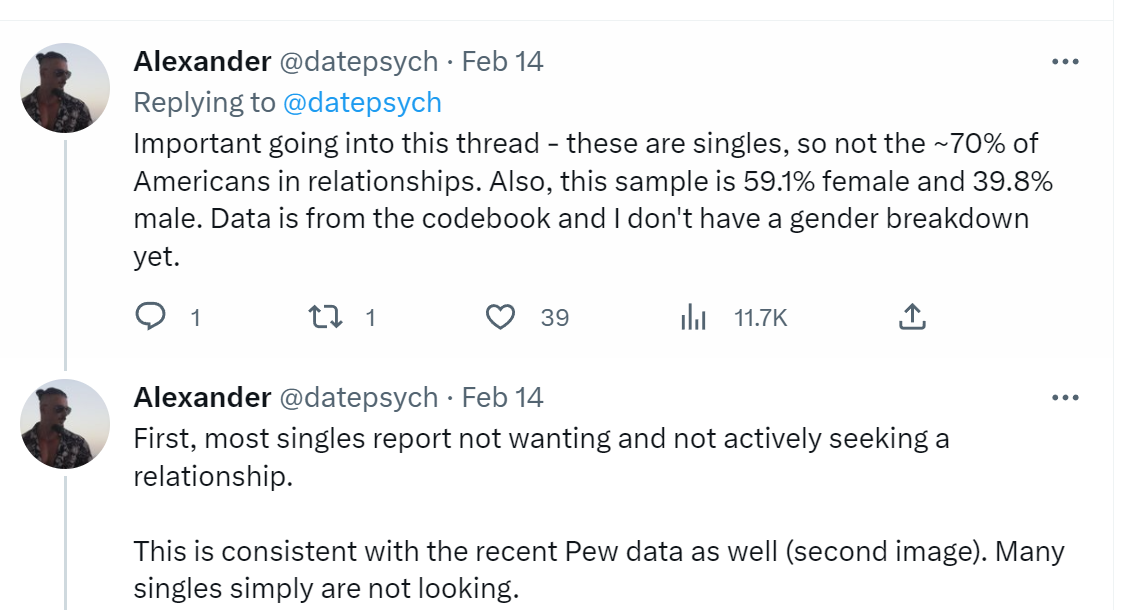
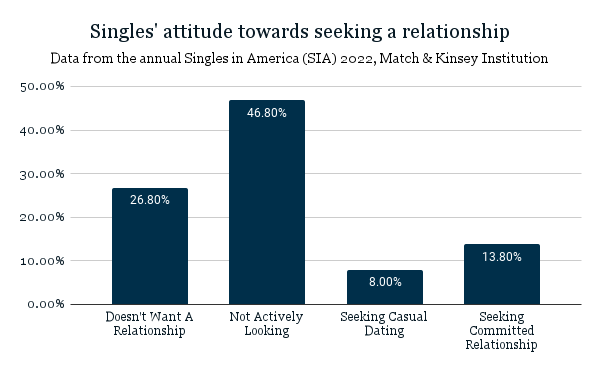
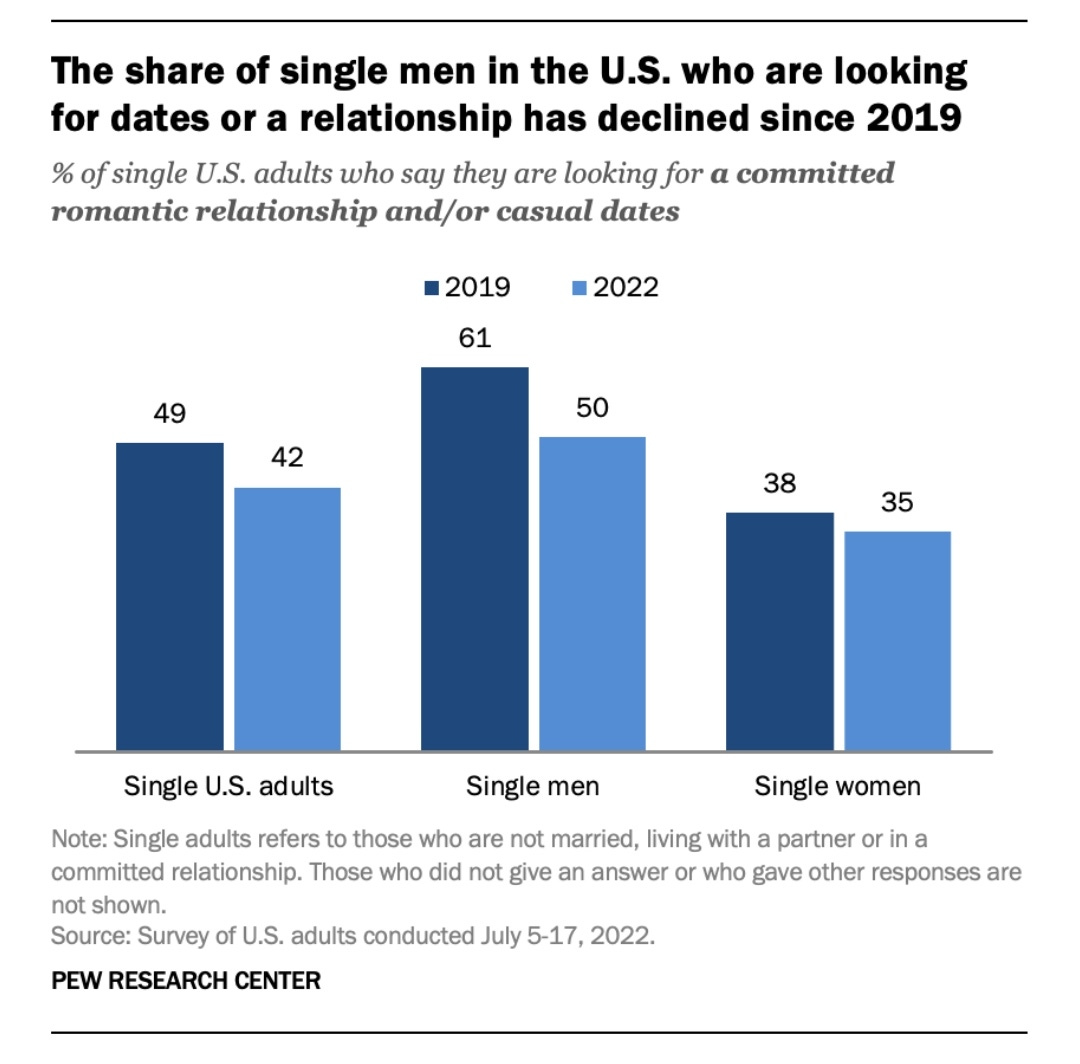

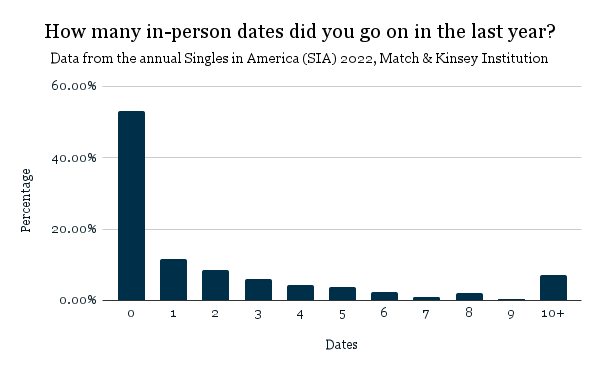
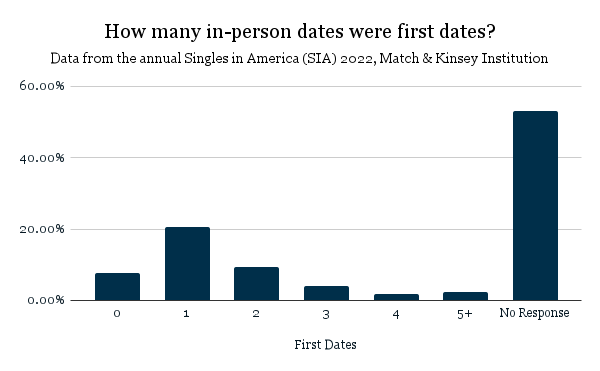
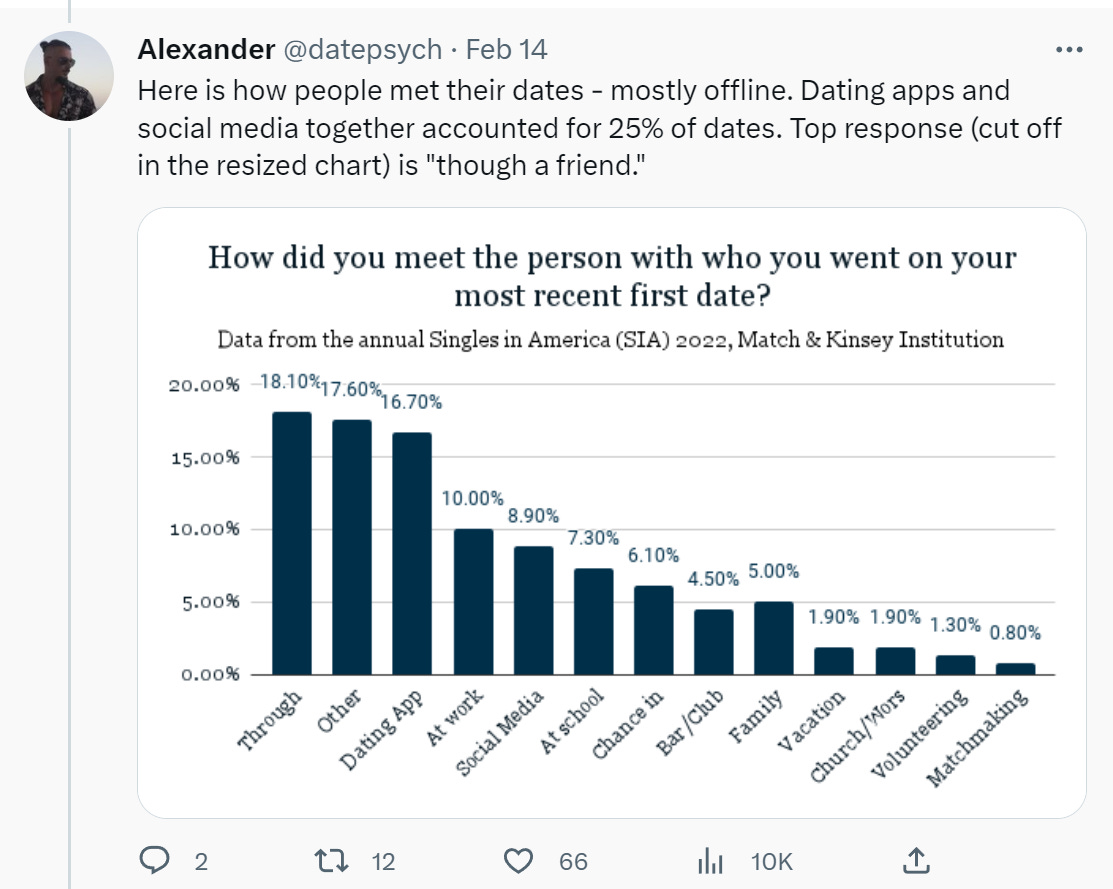
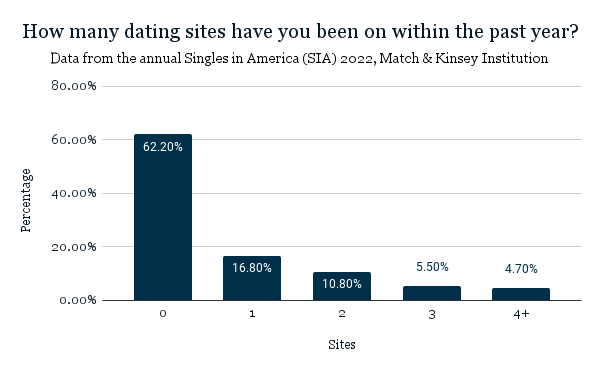
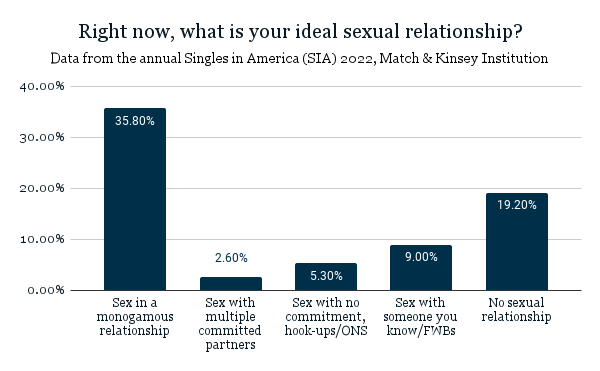
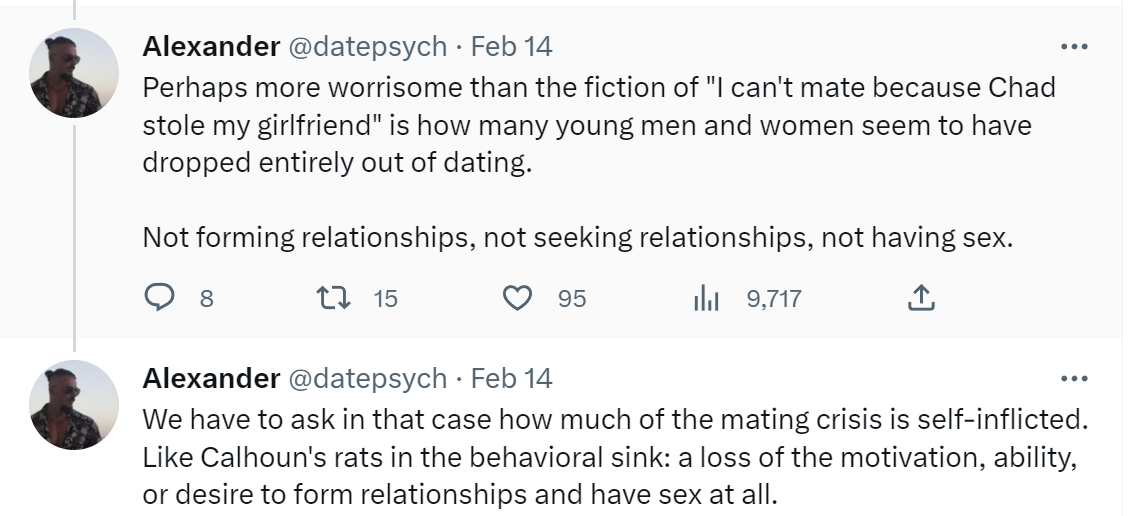
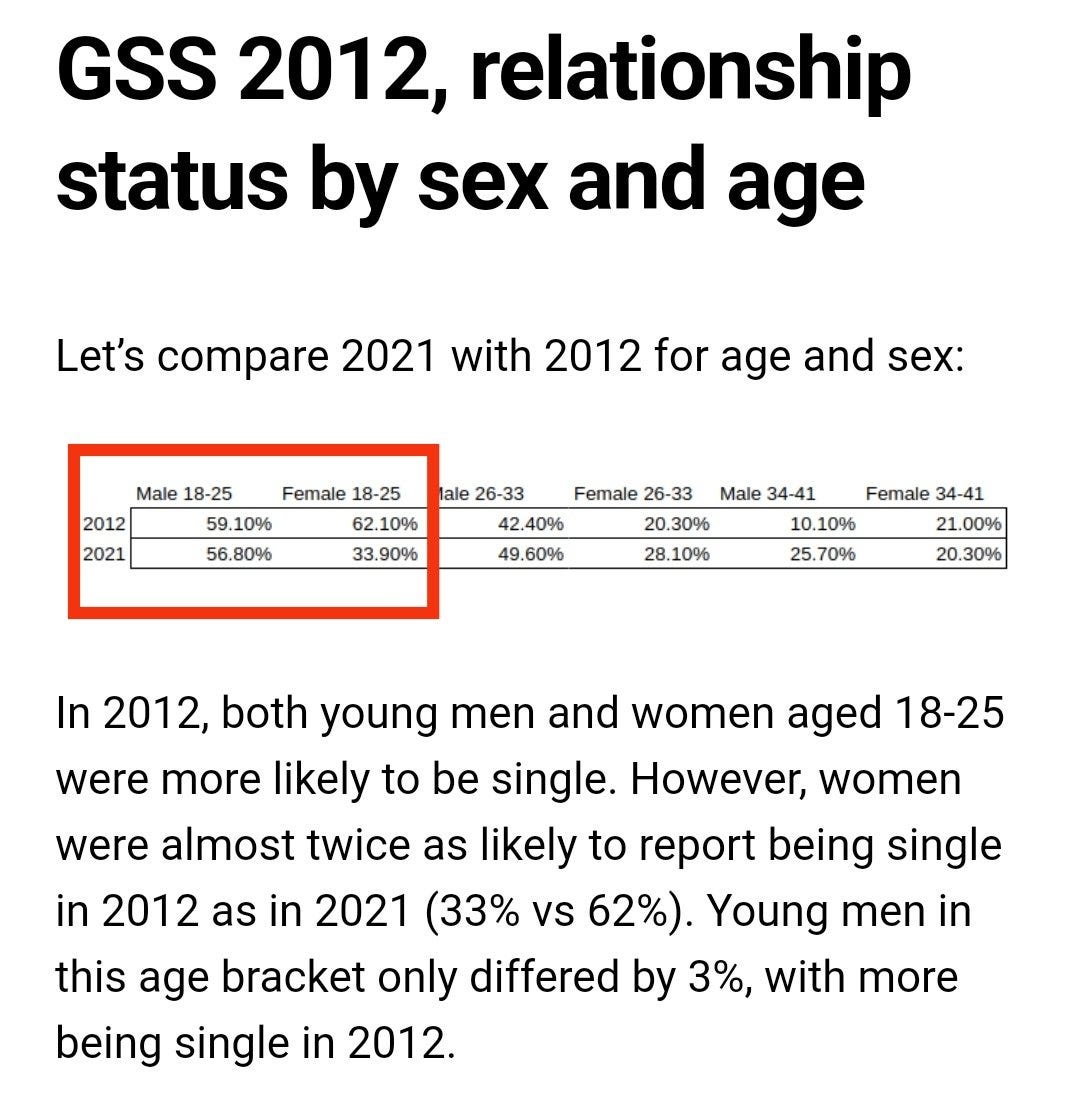
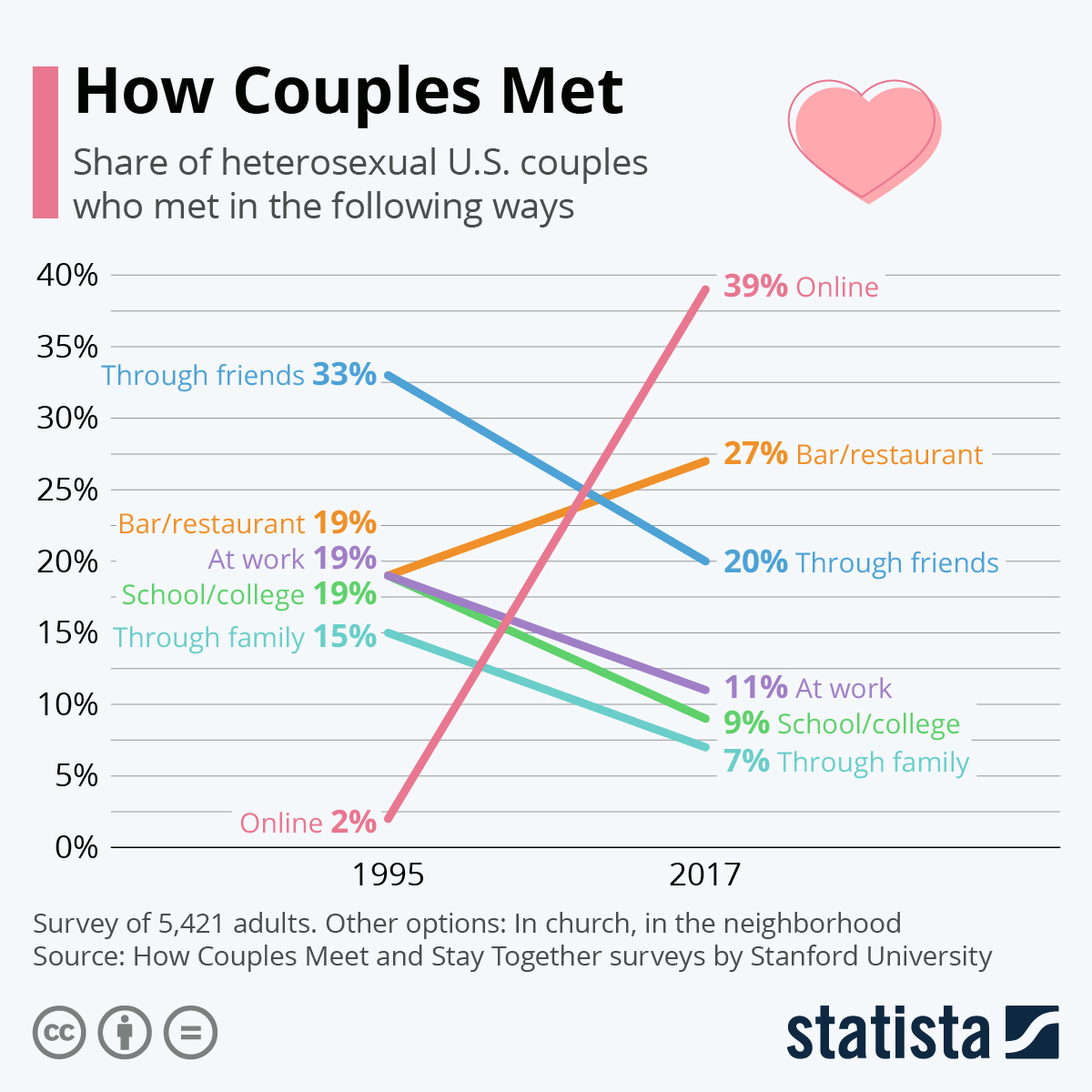
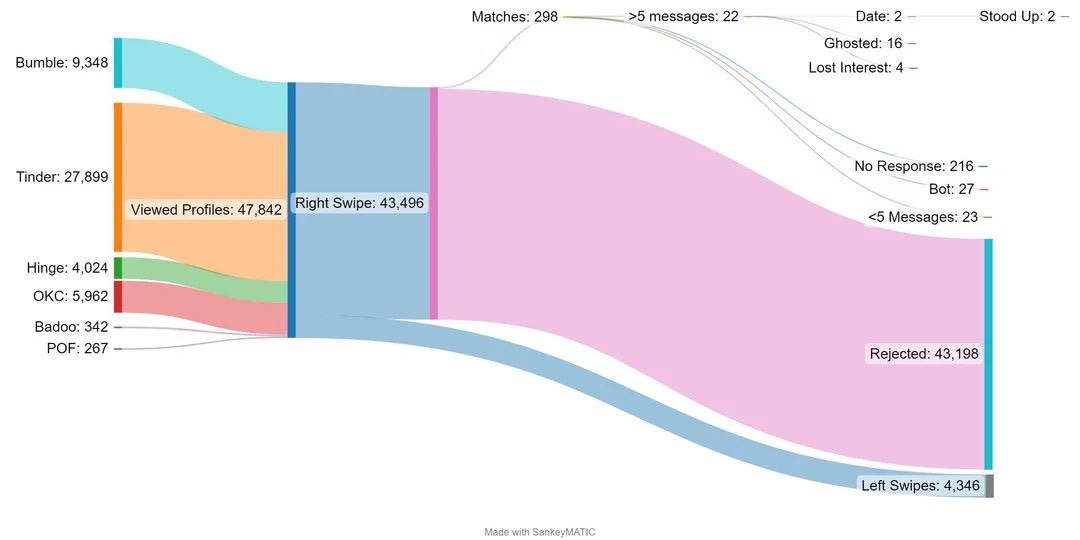
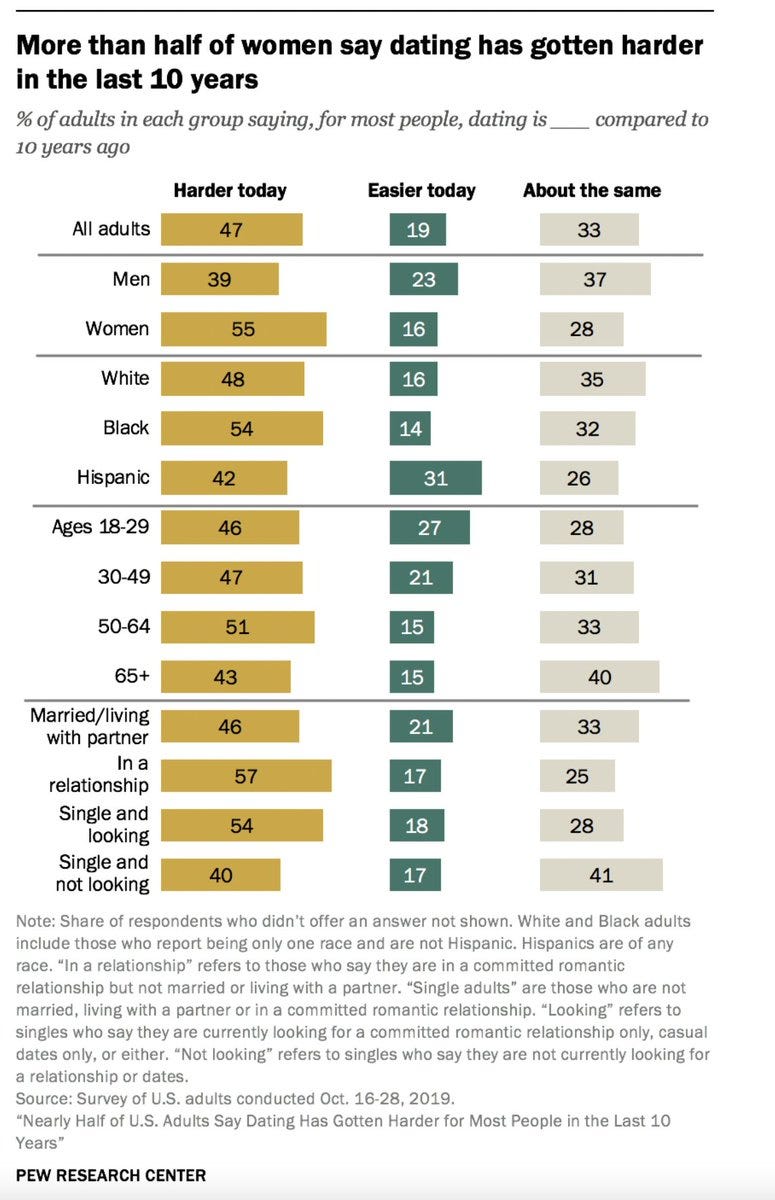
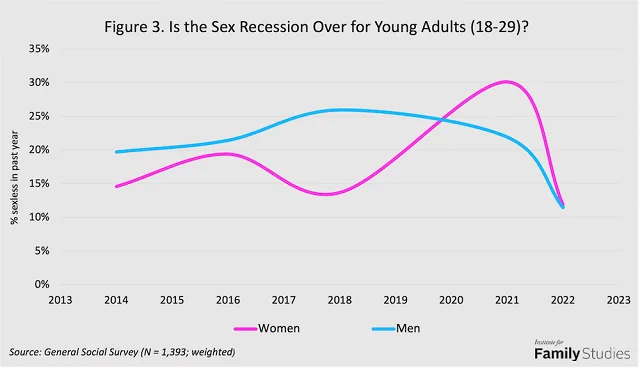
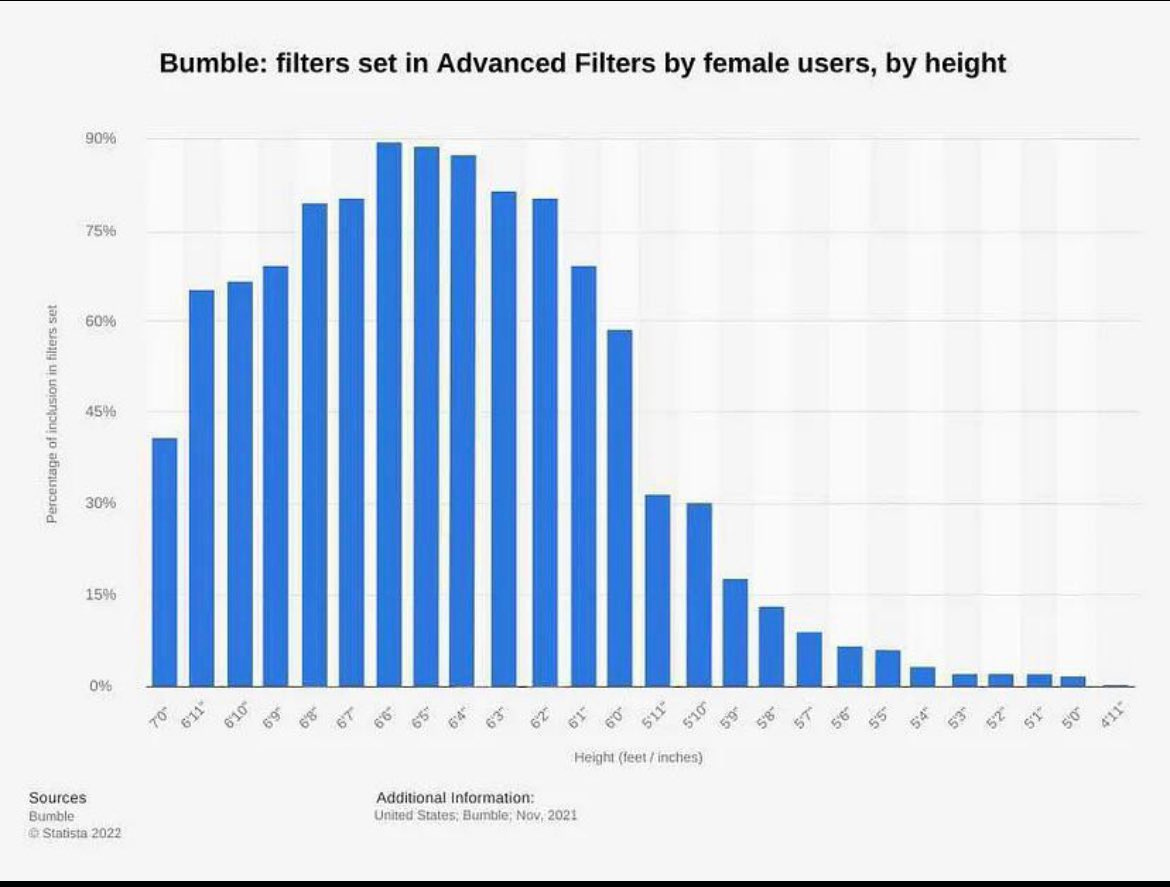
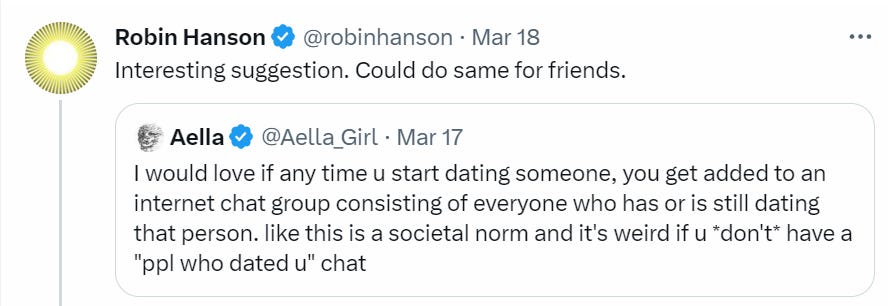


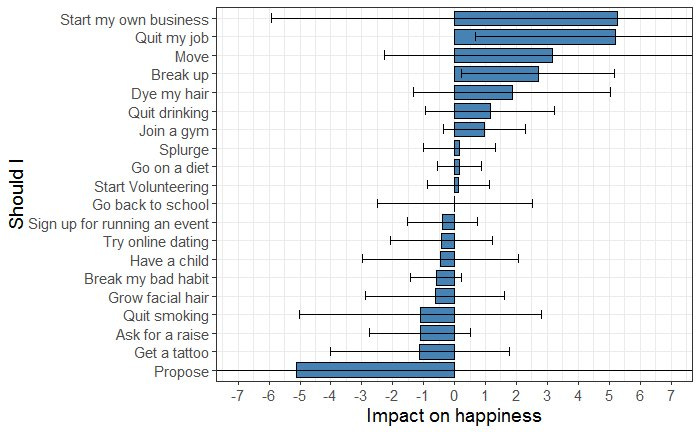
I would say that the biggest reason people are single is that they don't really want relationships. They want relationships in the same way they want to be billionaires or top performers, in a vague it-would-be-nice-but-sadly-it-is-impossible kind of way. But then it turns out that a committed or even a casual relationship doesn't really fit into their lives, their routines, their habits, their beliefs about the world and their expectations for the future as they are set up. They live their lives as pronouncements into the void. This is a valid life choice, but often people make it without fully knowing they are making it.
Fortunately, making space for relationships in your life is much easier than becoming a billionaire or a top performer. But since it is not happening by itself, a change somewhere must occur. And the only way to make change happen and not be at the mercy of being changed by chance is to revise fundamental assumptions, which is easy to say and hard to do unless you are a reader. Reading deeply teaches you to overhear yourself talking to yourself and recognize the contingent nature and structure of such speech, and then of your existence.
How would another person fit into your daily life, preferably for the better? Do you want them to fit? And how would you fit into their life, preferably for the better? How can you be good for them and they to you? Galaxy brain next-levelling dating tactics don't stem from this questions. Considerations about Ethics and performing plain level 1 generically solid actions such as acquiring new skills or healthy habits do. When you treat yourself and other people ethically, they tend to treat you better as well, and better relationships become possible. That is what good relationships are.
One potential advice for both men and women is to switch cities (or even countries), if at all feasible. If you're a man, move to NYC. If you're a woman, move to Silicon Valley. If you're gay, move to SF. If you're Mormon, move to Salt Lake City.
Here's a breakdown of US counties by the % of women aged 18-34, as well as the median 1-bedroom rent in each location: https://dpaste.com/7X6S3ART3. 54% of Manhattan (New York county) residents are women vs. only 47.3% of San Jose (Santa Clara county). This might seem like a small difference but if we assume that 70% of women are in a relationship, this means that Manhattan has 2 women for every single man while San Jose has 1.4 men for every single woman. In other words, dating in Manhattan should be **3** times easier than in San Jose.